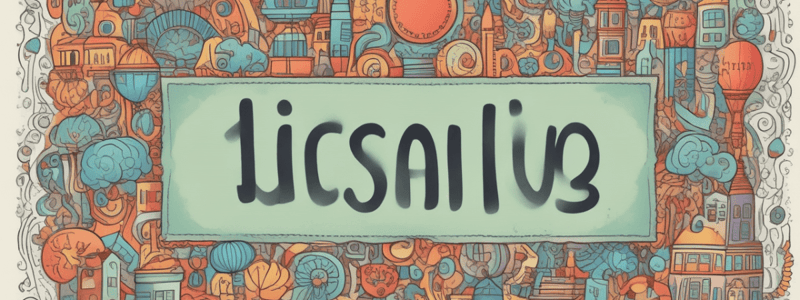Podcast
Questions and Answers
What is a characteristic of radical changing verbs?
What is a characteristic of radical changing verbs?
- They follow a unique pattern for each tense.
- They are only used in the past tense.
- They are irregular in their endings, but regular in their stem.
- Their endings follow the usual pattern for ar/er/ir verbs. (correct)
Which of the following verbs does not undergo a radical change in the present tense?
Which of the following verbs does not undergo a radical change in the present tense?
- querer
- comer (correct)
- pensar
- empezar
What is the radical change for verbs that change 'e' to something else in the present tense?
What is the radical change for verbs that change 'e' to something else in the present tense?
- e → eo
- e → ie (correct)
- e → ea
- e → i
Which of the following verbs undergoes a radical change from 'o' to 'ue' in the present tense?
Which of the following verbs undergoes a radical change from 'o' to 'ue' in the present tense?
What is the name of the change that occurs in verbs like 'mentir' and 'poder' in the present tense?
What is the name of the change that occurs in verbs like 'mentir' and 'poder' in the present tense?
Which of the following verbs does not undergo a radical change in the present tense?
Which of the following verbs does not undergo a radical change in the present tense?
Flashcards are hidden until you start studying
Study Notes
Radical Changing Verbs
- Radical changing verbs are irregular in their stem, but follow the usual pattern for ar/er/ir verbs in their endings
- The vowel in the stem directly before the ending changes
Characteristics of Radical Changing Verbs
- The change occurs for all persons except nosotros and vosotros
- There are three types of changes: e → ie, o → ue, and e → i
Common Radical Changing Verbs in the Present Tense
- thinking and learning verbs
- pensar (to think)
- recordar (to remember)
- entender (to understand)
- preferir (to prefer)
- querer (to want)
- sentir (to feel)
- probar (to try)
- action verbs
- empezar (to start)
- contar (to count)
- repetir (to repeat)
- cerrar (to close)
- volver (to return)
- competir (to compete)
- sentarse (to sit)
- mover (to move)
- freír (to fry)
- perder (to lose)
- communication verbs
- pedir (to ask for)
- referirse (to refer)
- mostrar (to demonstrate)
- mentir (to lie)
- sugerir (to suggest)
- poder (to be able to)
- other verbs
- dormir (to sleep)
- encontrarse (to meet)
- despedir (to say goodbye)
- despertarse (to wake up)
- colgar (to hang)
- consentir (to allow)
- volar (to fly)
- advertir (to warn)
- morir (to die)
- servir (to be useful)
- reír (to laugh)
- soñar (to dream)
- resolver (to resolve)
- medir (to measure)
- impedir (to prevent)
Studying That Suits You
Use AI to generate personalized quizzes and flashcards to suit your learning preferences.




